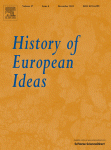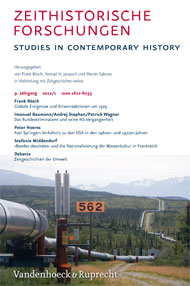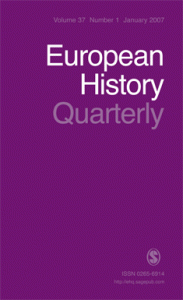 The new issue of ” History of European Ideas” is now available and includes the following articles:
The new issue of ” History of European Ideas” is now available and includes the following articles:
The Bond of Civility: Roger Williams on toleration and its limits by Teresa M. Bejan
In this article, I examine the meaning of the concept of ‘civility’ for Roger Williams and the role it played in his arguments for religious toleration. I place his concern with civility in the broader context of his life and works and show how it differed from the missionary and civilizing efforts of his fellow New English among the American Indians. For Williams, civility represented a standard of inclusion in the civil community that was ‘essentially distinct’ from Christianity, which properly governed membership in the spiritual community of the church. In contrast to recent scholarship that finds in Williams a robust vision of mutual respect and recognition between co-citizens, I argue that civility constituted rather a very low bar of respectful behavior towards others entirely compatible with a lack of respect, disapproval, and even disgust for them and their beliefs. I show further that civility for Williams was consistent with—and partially secured by—a continued commitment on the part of godly citizens to the potential conversion of their neighbors. Williams endorsed this ‘mere’ civility as a necessary and sufficient condition for toleration while also delineating a potentially expansive role for the magistrate in regulating incivility. Contemporary readers of William who conflate civility with other good things, such as mutual respect, recognition, and civic friendship, slide into a position much like that he was trying to refute.
From Greece to Babylon: The political thought of Andrew Michael Ramsay (1686-1743) by Doohwan Ahn
This paper explores the political thought of Andrew Michael Ramsay with particular reference to his highly acclaimed book called A New Cyropaedia, or the Travels of Cyrus (1727). Dedicated to Prince Charles Edward Stuart, the Young Pretender, to whom he was tutor, this work has been hitherto viewed as a Jacobite imitation of the Telemachus, Son of Ulysses (1699) of his eminent teacher archbishop Fénelon of Cambrai. By tracing the dual legacy of the first Persian Emperor Cyrus in Western thought, I demonstrate that Ramsay was as much indebted to Jacques-Bénigne Bossuet’s Discourse on Universal History (1681) as he was to Fénelon’s political romance. Ramsay took advantage of Xenophon’s silence about the eponymous hero’s adolescent education in his Cyropaedia, or the Education of Cyrus (c. 380 B.C.), but he was equally inspired by the Book of Daniel, where the same Persian prince was eulogised as the liberator of the Jewish people from their captivity in Babylon. The main thrust of Ramsay’s adaptation was not only to revamp the Humanist-cum-Christian theory and practice of virtuous kingship for a restored Jacobite regime, but on a more fundamental level, to tie in secular history with biblical history. In this respect, Ramsay’s New Cyropaedia, or the Travels of Cyrus, was not just another Fénelonian political novel but more essentially a work of universal history. In addition to his Jacobite model of aristocratic constitutional monarchy, it was this Bossuetian motive for universal history, which was first propounded by the German reformer Philipp Melanchthon in his Chronicon Carionis (1532), that most decisively separated Ramsay from Henry St. John, Viscount Bolingbroke, author of another famous advice book for princes of the period, The Idea of a Patriot King (written in late 1738 for the education of Frederick Lewis, Prince of Wales, but officially published in 1749).
The moral person of the state: Emer de Vattel and the foundations of international legal order by Ben Holland
Emer de Vattel was the first writer systematically to combine three arguments in a single work, namely: that states have a fundamental duty of self-interestedness; that they nonetheless have reason to see themselves as inhabiting a kind of society; and that this society is held together by positive agreements between its members on rules that shall regulate their interactions. This article explores how Vattel arrived at his vision of international order. It points to the significance of his understanding of the state as being a ‘moral person’. This was a description of the state introduced by Samuel von Pufendorf, who argued that the state was a moral person because it possessed the moral faculties of intellect and will. This helped to ground a constitutionalist theory of the state, for intellect and will, being represented by separate institutions of the state, in effect balanced each other. But the notion of the state as a moral person was later taken up in a rival intellectual tradition that allotted no independence to the will. This was the philosophical tradition to which Vattel belonged. In this altered context, the notion of moral personality was transformed. I argue that this was critical to the formulation of Vattel’s theory.
Jeremy Bentham’s ‘unsually liberal’ representative democracy by Filimon Peonidis
Jeremy Bentham is a philosopher who deserves a prominent position in the history of democratic ideas. He not only thought popular rule as a vehicle for materializing his vision of utilitarian society, but also gave us a detailed picture of the basic institutions of the form of democratic governance he envisaged. It is also noteworthy that in his radical system the people, who are the ultimate and undisputable source of all power, are protected from the authoritarian tendencies of state authorities not by a bill of constitutional rights but by a set of enhanced democratic powers that enable them to exercise strict control over their elected representatives. In this essay we present an outline of his ‘unusually liberal’ theory of democracy based on recently published texts and studies as well as a brief assessment of its strong and weak points.
Vergemeinschaftung and vergesellschaftung in Max Weber: A reconstruction of his linguistic usage by Klaus Lichtblau
When Max Weber made use of the terms “Vergemeinschaftung” and “Vergesellschaftung” in the first chapter of “Economy and Society”, he was among other things alluding to Ferdinand Tönnies’ well-known usage of “Gemeinschaft” and “Gesellschaft”, as well as to related conceptions in the work of Georg Simmel. However, Weber’s usage not only differed from the senses in which Tönnies and Simmel used these terms; he had himself altered his own usage since the early draft of this chapter, published in 1913 as “On some Categories of Interpretive Sociology”. The tangled resonances that result from this are carefully identified and separated, and in so doing light is shed upon the nature and status of Weber’s intentions in writing his important chapter on “Basic Sociological Categories”.
The uses and abuses of ‘secular religion’: Jules Monnerot’s path from communism to fascism by Dan Stone
From starting his intellectual career as a surrealist, communist and co-founder of the Collège de Sociologie in 1937, Jules Monnerot (1911–95) ended it as a candidate for the Front National in 1989. In this article I offer an explanation for the unexpected trajectory of this thinker whose work is little known in the English-speaking world. Without overlooking the idea that the infamous College encouraged such tendencies, I argue that the notion of ‘secular religion’, as Monnerot developed it in his Sociology of Communism (1949), goes some way to explain his gradual radicalization from Cold Warrior to fascist, a path that otherwise seems unlikely for a French intellectual after World War II. In order to emphasize the unusualness of Monnerot’s case, I contrast it with that of his erstwhile collaborator, Georges Bataille. I show that accusations of fascism often levelled against Bataille should be more accurately directed at Monnerot, indeed that the fascism inherent within the College of Sociology was brought out not by Bataille but by Monnerot. Monnerot’s case is unsettling first because his definition of ‘secular religion’ contributed to his pro-fascist stance; and second, because it forces us to rethink what is meant by ‘philosophy after Auschwitz.’ This term usually brings to mind scholars such as T.W. Adorno, Emil Fackenheim or Emmanuel Levinas. Monnerot provides a rare example of a thinker whose fascism only developed after the Holocaust, a shocking response that demands the attention of all those interested in the relationship between religion and politics.
An ineluctable minimum of natural law: Francois Gény, Oliver Wendell Holmes, and the limits of legal skepticism by Ward Alexander Penfold
During the first few decades of the twentieth century, legal theory on both sides of the Atlantic was characterized by a tremendous amount of skepticism toward the private law concepts of property and contract. In the United States and France, Oliver Wendell Holmes and François Gény led the charge with withering critiques of the abuse of deduction, exposing their forebears’ supposedly gapless system of private law rules for what it was, a house of cards built on the ideological foundations of laissez faire capitalism. The goal was to make the United States Constitution and the French civil code more responsive to the realities of industrialization. Unlike the other participants in this transatlantic critique, François Gény simultaneously insisted on the immutability of justice and social utility. His “ineluctable minimum of natural law” would guide judges and jurists toward the proper social ends, replacing deduction with teleology. The problem was that nearly all of Gény’s contemporaries were perplexed by his conception of natural law, which lacked the substance of the natural rights tradition of the eighteenth and nineteenth centuries and the historicist impulse of the early twentieth. No one was more perplexed than Oliver Wendell Holmes, whose more thoroughgoing skepticism led him to see judicial restraint as the only solution to the abuse of deduction. The ultimate framework for this debate was World War I, in which both Holmes and Gény thought they had found vindication for their views. Events on the battlefield reaffirmed Gény’s commitment to justice just as they reignited Holmes’ existential embrace of the unknown. In a sense, the limits of their skepticism would be forged in the trenches of the Great War.
Hugh Trevor-Roper and the history of ideas by Peter Ghosh
A wave of recent publication connected to Hugh Trevor-Roper offers cause to take stock of his life and legacy. He is an awkward subject because his output was so protean, but a compelling one because of his significance for the resurgence of the history of ideas in Britain after 1945. The article argues that the formative period in Trevor-Roper’s life was 1945–57, a period curiously neglected hitherto. It was at this time that he pioneered a history of ideas conceived above all as the study of European liberal and humanist tradition. Analysis of the relative importance of contemporary and early modern history in his oeuvre finds that, while the experience of Hitler and the Cold War was formative, it was not decisive.Trevor-Roper was at heart an early modernist who did not abjure specialization.However, he insisted that specialized study must be accompanied by “philosophical” reflection on the workings of a constant human nature present throughout history, a type of reflection best pursued by reading classical historians such as Gibbon and Burckhardt.Yet this imperative in turn fostered purely historical research into the history of historical writing – another branch of the history of ideas.
Historical reflections upon commerce, political economy and revolution in the eighteenth-century Atlantic World by Manuela Albertone
No abstract . It’s the review essay.
 A new issue of La Revue de l’Histoire has been published
A new issue of La Revue de l’Histoire has been published








